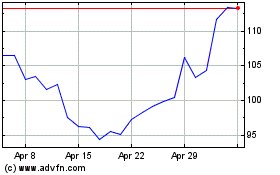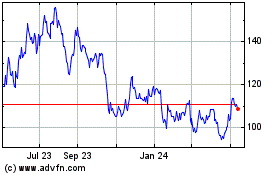Tech Companies Tap New Talent From Academia -- WSJ
November 25 2016 - 3:02AM
Dow Jones News
Companies recruit top experts in artificial intelligence to
industry positions
By Daniela Hernandez and Rachael King
Alphabet Inc.'s Google division last week hired the director of
Stanford University's artificial intelligence lab to lead a new AI
unit, the latest in a long line of academic stars in artificial
intelligence lured away by tech giants.
Fei-Fei Li, a respected computer scientist, wrote in a Facebook
post that she joined Google partly to "democratize AI." She joined
several other top professors who have left academia in recent years
for tech industry posts.
In recent years, Geoffrey Hinton joined Google from the
University of Toronto, New York University's Yann LeCun went to
Facebook Inc., Stanford's Andrew Ng joined Baidu Inc., and Carnegie
Mellon University's Alex Smola moved to Amazon Inc. Many of these
researchers continue to work at the universities in a diminished
capacity.
Researchers warn that tech companies are draining universities
of the scientists responsible for cultivating the next generation
of researchers and who contribute to solving pressing problems in
fields ranging from astronomy to environmental science to
physics.
The share of newly minted U.S. computer-science Ph.D.s taking
industry jobs has risen to 57% from 38% over the last decade,
according to data from the National Science Foundation. Though the
number of Ph.D.s in the field has grown, the proportion staying in
academia has hit "a historic low," according to the Computing
Research Association, an industry group.
Such moves could have a long-term impact on the number of
graduates available for teaching positions because it takes three
to five years to earn a doctorate in computer science. "People are
starting to question whether we are, in some sense, jeopardizing
our ability to meet industry demand in the future," said Mark
Riedl, the director of the Georgia Institute of Technology's
Entertainment Intelligence Lab.
The squeeze is especially tight in deep learning, an AI
technique that has played a crucial role in moneymaking services
like online image search, language translation and ad placement,
said Yoshua Bengio, director of the University of Montreal's
Montreal Institute for Learning Algorithms. Students in artificial
intelligence are "worth somewhere between $5 million and $10
million to a company's bottom line," said Andrew Moore, dean of
CMU's School of Computer Science.
The tech giants offer perks that few universities can match,
including steady funding, immense data sets and computing power,
and the thrill of creating products that touch millions of people.
Corporate salaries are much higher and may include a potential
bonanza in stock options. The median annual salary for university
postdocs in computer and information sciences was $55,000 in 2014,
compared with $110,000 in industry labs, according to NSF data.
Researchers worry that the brain drain will interfere with
progress in academic efforts to solve serious problems in fields
like environmental science. "I am concerned that it will slow down
our [rate of] discovery in the university and research labs because
some of the best and brightest won't be here," said Sue Haupt of
the National Center for Atmospheric Research. One of her top
researchers was hired by Weather Company, now a division of
International Business Machines Corp.
Carnegie Mellon has responded to the talent war by allowing
faculty to cycle between the university and industry. Dr. Moore
assumes that between 10% and 20% of people he hires will take
"leaves of absence at any given time" to work in industry or to
found a startup. "We really are expecting people to rotate in and
out."
AI experts at tech giants including Microsoft, Google and
Facebook say they are attempting to mitigate the exodus from
academia to industry by funding university departments and training
students. IBM recently launched Cognitive Horizons Network, a
consortium of six schools that aims to keep academics in university
positions, according to Guru Banavar, vice president for IBM
Research. This week, Google pledged $3.4 million to Dr. Bengio's AI
lab at the University of Montreal, which is part of IBM's
consortium. Facebook, Baidu and Microsoft said they also fund
academic research.
Apple and Amazon declined to comment.
In some cases, tech companies allow their academic hires to
retain university appointments. But employment curtails time spent
teaching and sometimes limits discussion of topics related to work.
Stanford's Dr. Li said in her Facebook post that she would continue
teaching at Stanford some quarters, though she didn't offer
details. Dr. Hinton splits his time between Google and the
University of Toronto, where he still mentors three graduate
students, he said. Dr. LeCun, who heads Facebook AI Research, is
teaching one class this academic year, down from two before his
employment at Facebook, according to NYU's course catalog.
"Although it is very good that a number of [industry]
researchers often continue in some role at their academic
institution, it is of course not quite the same for the students,"
said Bart Selman, a Cornell University AI professor. Enrollment in
AI-related classes at some schools has more than tripled recently,
he and others said, leaving remaining faculty members with far less
time per student.
--Deepa Seetharaman contributed to this article.
Write to Daniela Hernandez at daniela.hernandez@wsj.com and
Rachael King at rachael.king@wsj.com
(END) Dow Jones Newswires
November 25, 2016 02:47 ET (07:47 GMT)
Copyright (c) 2016 Dow Jones & Company, Inc.
Baidu (NASDAQ:BIDU)
Historical Stock Chart
From Mar 2024 to Apr 2024

Baidu (NASDAQ:BIDU)
Historical Stock Chart
From Apr 2023 to Apr 2024
